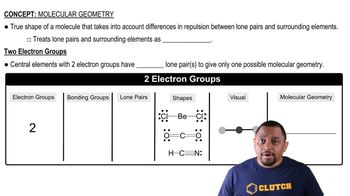The following ball-and-stick molecular model is a representation of acetaminophen, the active ingredient in such over-thecounter headache remedies as Tylenol. (Red = O, gray = C, blue = N, ivory = H.) (b) Indicate the positions of the multiple bonds in acetaminophen.
Ch.8 - Covalent Compounds: Bonding Theories and Molecular Structure
All textbooks McMurry 8th Edition
McMurry 8th Edition Ch.8 - Covalent Compounds: Bonding Theories and Molecular Structure
Ch.8 - Covalent Compounds: Bonding Theories and Molecular Structure Problem 37b
Problem 37b
 McMurry 8th Edition
McMurry 8th Edition Ch.8 - Covalent Compounds: Bonding Theories and Molecular Structure
Ch.8 - Covalent Compounds: Bonding Theories and Molecular Structure Problem 37b
Problem 37bChapter 8, Problem 37b
Two dichloroethylene molecules with the same chemical formula 1C2H2Cl22, but different arrangements of atoms are shown. (b) Which form of dichloroethylene has a dipole moment of 2.39 D, and which has a dipole moment of 0.00 D?

Verified Solution
Video duration:
2mWas this helpful?
Key Concepts
Here are the essential concepts you must grasp in order to answer the question correctly.
Molecular Geometry
Molecular geometry refers to the three-dimensional arrangement of atoms within a molecule. The shape of a molecule influences its polarity, as the spatial distribution of polar bonds can lead to an overall dipole moment. For dichloroethylene, the arrangement of chlorine and hydrogen atoms affects whether the molecule is symmetrical or asymmetrical, which is crucial for determining its dipole moment.
Recommended video:
Guided course

Molecular Geometry with Two Electron Groups
Polarity and Dipole Moment
Polarity in molecules arises from differences in electronegativity between atoms, leading to uneven distribution of electron density. A dipole moment is a vector quantity that measures the separation of positive and negative charges in a molecule. Molecules with a net dipole moment, such as one form of dichloroethylene, exhibit polarity, while symmetrical molecules may have a dipole moment of zero due to cancellation of individual bond dipoles.
Recommended video:
Guided course

Dipole Moment
Isomerism
Isomerism occurs when two or more compounds have the same molecular formula but different structural arrangements of atoms. In the case of dichloroethylene, the two isomers can have different physical properties, including dipole moments. Understanding isomerism is essential for predicting how the arrangement of atoms affects molecular behavior, such as polarity and reactivity.
Recommended video:
Guided course

Isomerism in Coordination Complexes Example
Related Practice
Textbook Question
814
views
Textbook Question
The following ball-and-stick molecular model is a representation of thalidomide, a drug that causes birth defects when taken by expectant mothers but is valuable for its use against leprosy. The lines indicate only the connections between atoms, not whether the bonds are single, double, or triple. 1Red = O, gray = C, blue = N, ivory = H.2 (a) What is the formula of thalidomide?
332
views
Textbook Question
Ethyl acetate, CH3CO2CH2CH3, is commonly used as a solvent and nail-polish remover. Look at the following electrostatic potential map of ethyl acetate, and explain the observed polarity.
691
views
Textbook Question
What geometric arrangement of charge clouds do you expect
for atoms that have the following number of charge clouds?
(a) 3 (b) 5 (c) 2 (d) 6
510
views
Textbook Question
What shape do you expect for molecules that meet the following
descriptions?
(a) A central atom with two lone pairs and three bonds to
other atoms
(b) A central atom with two lone pairs and two bonds to
other atoms
(c) A central atom with two lone pairs and four bonds to
other atoms
603
views
Textbook Question
How many charge clouds are there around the central atom in molecules that have the following geometry?
(a) Tetrahedral (b) Octahedral
(c) Bent (d) Linear
(e) Square pyramidal (f) Trigonal pyramidal
799
views